119 books about 1225?-1274 and 9
start with S
119 books about 1225?-1274 and 9
119 books about 1225?-1274
9 start with S start with S
9 start with S start with S

The Saint and the Atheist
Thomas Aquinas and Jean-Paul Sartre
Joseph S. Catalano
University of Chicago Press, 2021
It is hard to think of two philosophers less alike than St. Thomas Aquinas and Jean-Paul Sartre. Aquinas, a thirteenth-century Dominican friar, and Sartre, a twentieth-century philosopher and atheist, are separated by both time and religious beliefs. Yet, for philosopher Joseph S. Catalano, the two are worth bringing together for their shared concern with a fundamental issue: the uniqueness of each individual person and how this uniqueness relates to our mutual dependence on each other. When viewed in the context of one another, Sartre broadens and deepens Aquinas’s outlook, updating it for our present planetary and social needs. Both thinkers, as Catalano shows, bring us closer to the reality that surrounds us, and both are centrally concerned with the place of the human within a temporal realm and what stance we should take on our own freedom to act and live within that realm. Catalano shows how freedom, for Sartre, is embodied, and that this freedom further illuminates Aquinas’s notion of consciousness.
Compact and open to readers of varying backgrounds, this book represents Catalano’s efforts to bring a lifetime of work on Sartre into an accessible consideration of philosophical questions by placing him in conversation with Aquinas, and it serves as a primer on key ideas of both philosophers. By bringing together these two figures, Catalano offers a fruitful space for thinking through some of the central questions about faith, conscience, freedom, and the meaning of life.
Compact and open to readers of varying backgrounds, this book represents Catalano’s efforts to bring a lifetime of work on Sartre into an accessible consideration of philosophical questions by placing him in conversation with Aquinas, and it serves as a primer on key ideas of both philosophers. By bringing together these two figures, Catalano offers a fruitful space for thinking through some of the central questions about faith, conscience, freedom, and the meaning of life.
[more]
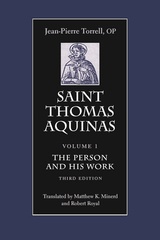
Saint Thomas Aquinas
The Person and His Work
Jean-Pierre Torrell, OP
Catholic University of America Press, 2022
The presentation of the life and work of any great thinker is a formidable task, even for a renowned scholar. This is all the more the case when such a historical figure is a saint and mystic, such as Friar Thomas Aquinas. In this volume, Fr. Jean-Pierre Torrell, OP, masterfully takes up the strenuous task of presenting such a biography, providing readers with a detailed, scholarly, and profound account of the thirteenth-century theologian whose works have not ceased to draw the attention of both friend and foe! In this volume, Fr. Torrell, an internationally renowned expert on St. Thomas, speaks to neophytes and experts alike: for those new to Thomas’s works, he paints an engaging human portrait of Friar Thomas in his historical context; for specialists, he provides a rigorous scholarly account of contemporary research concerning Thomas’s life and work. This new edition of Fr. Torrell’s widely-lauded text involved significant revision, expansion, and bibliographical updates in light of the latest scholarship. The Catholic University of America Press is pleased to present such an eminent specialist’s mature synthesis concerning Friar Thomas Aquinas.
[more]
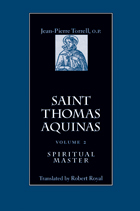
Saint Thomas Aquinas, Volume 2
Spiritual Master
Jean-Pierre Torrell
Catholic University of America Press, 1996
Following his highly acclaimed study of the life and works of Saint Thomas Aquinas, Jean-Pierre Torrell, O.P., continues his masterful work on the great Dominican theologian and brings an immense learning to bear on a subject that most readers have not considered very carefully: Thomas's spirituality
[more]

Salvation through Temptation
Maximus the Confessor and Thomas Aquinas on Christ's Victory over the Devil
Benjamin E. Heidgerken
Catholic University of America Press, 2021
Salvation through Temptation describes the development of predominant Greek and Latin Christian conceptions of temptation and of the work of Christ to heal and restore humankind in the context of that temptation, focusing on Maximus the Confessor and Thomas Aquinas as well-developed examples of Greek and Latin thought on these matters.
Maximus and Thomas represent two trajectories concerning the woundedness of human emotionality in the wake of the primordial human sin. Heidgerken argues that Maximus stands in essential continuity with earlier Greek ascetic theology, which conceives of the weakness of fallen humankind in demonological categories, so that the Pauline law of sin is bound to external demonic agents that act upon the human mind through thoughts, desires, and sensory impressions. For Thomas, on the other hand, this wound consists primarily of an internal disordering of the faculties that results from the withdrawal of original grace: concupiscence or the fomes peccati. Yet even in this framework, the devil plays a significant role in Thomas’s account of postlapsarian temptation.
On the basis of these differing frameworks for human temptation, Heidgerken demonstrates the centrality of Christ’s exemplarity in the Greek account and the centrality of Christ’s moral perfections in the Latin account. As a consequence of these emphases, the Greek tradition of Maximus places distinct limits on the ability of human emotionality (even that of Christ) to be perfected in this life, whereas Thomas’s approach allows Christ to completely embody a perfected form of human emotionality in his earthly life. Reciprocally, Thomas’s account of Christ’s moral perfections and virtue places distinct limits on his affirmation of Christ’s experience of postlapsarian temptation, whereas Maximus’s account allows for Christ to experience interior forms of temptation that more closely mirror the concrete moral experiences and circumstances of fallen human beings. Salvation through Temptation recommends a retrieval of early ascetic theology and demonology as the best contemporary systematic and ecumenically-viable approach to Christ’s temptation and victory over the devil.
[more]
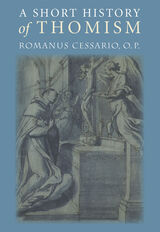
A Short History of Thomism
Romanus Cessario, O.P.
Catholic University of America Press, 2005
Using carefully selected resources, Romanus Cessario has composed a short account of the history of the Thomist tradition as it manifests itself through the more than seven hundred years that have elapsed since the death of Saint Thomas
[more]

Silence Of St Thomas
Josef Pieper
St. Augustine's Press, 1999
A single theme runs through the three essays on St. Thomas gather in this book. It is the theme of mystery or, more exactly, the response of the searching human intellect to the fact of mystery. Both the fact and the response are suggested in a short biography of St. Thomas that forms the first essay and are then sketched out in detail by a presentation of the “negative element” in his philosophy. The third essay shows that contemporary Existentialism is in basic agreement with the philosophia perennis on this fundamental element of philosophical thinking.
[more]
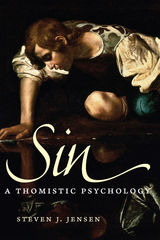
Sin
A Thomistic Psychology
Steven J. Jensen
Catholic University of America Press, 2018
If the human soul is made for good, then how do we choose evil? On the other hand, perhaps the human soul is not made for good. Perhaps the magnitude of human depravity reveals that the human soul may directly choose evil. Notably, Thomas Aquinas rejects this explanation for the prevalence of human sin. He insists that in all our desires we seek what is good. How, then, do we choose evil? Only by mistaking evil for good. This solution to the difficulty, however, leads Aquinas into another conundrum. How can we be held responsible for sins committed under a misunderstanding of the good? The sinner, it seems, has simply made an intellectual blunder. Sin has become an intellectual defect rather than a depravity of will and desire. Sin: A Thomistic Psychology grapples with these difficulties. A solution to the problem must address a host of issues. Does the ultimate good after which we all strive have unity, or is it simply a collection of basic goods? What is venial sin? What momentous choice must a child make in his first moral act? In what way do passion, a habitually evil will, and ignorance cause human beings to sin? What is the first cause of moral evil? Do human beings have free will to determine themselves to particular actions? The discussion of these topics focuses upon the interplay of reason, will, and the emotions, examining the inner workings of our moral deliberations. Ultimately, the book reveals how the failure to maintain balance in our deliberations subverts our fidelity to the one true good.
[more]
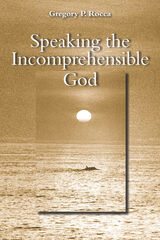
Speaking the Incomprehensible God
Thomas Aquinas on the Interplay of Positive and Negative Theology
Gregory P. Rocca O.P.
Catholic University of America Press, 2004
Gregory Rocca's nuanced discussion prevents Aquinas's thought from being capsulized in familiar slogans and is an antidote to unilateralist or monochrome views about God-talk.
[more]
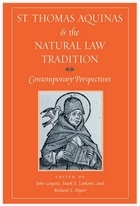
St. Thomas Aquinas and the Natural Law Tradition
Contemporary Perspectives
John Goyette
Catholic University of America Press, 2004
To explore and evaluate the current revival, this volume brings together many of the foremost scholars on natural law. They examine the relation between Thomistic natural law and the larger philosophical and theological tradition. Furthermore, they assess the contemporary relevance of St. Thomas's natural law doctrine to current legal and political philosophy.
[more]
READERS
Browse our collection.
PUBLISHERS
See BiblioVault's publisher services.
STUDENT SERVICES
Files for college accessibility offices.
UChicago Accessibility Resources
home | accessibility | search | about | contact us
BiblioVault ® 2001 - 2024
The University of Chicago Press









